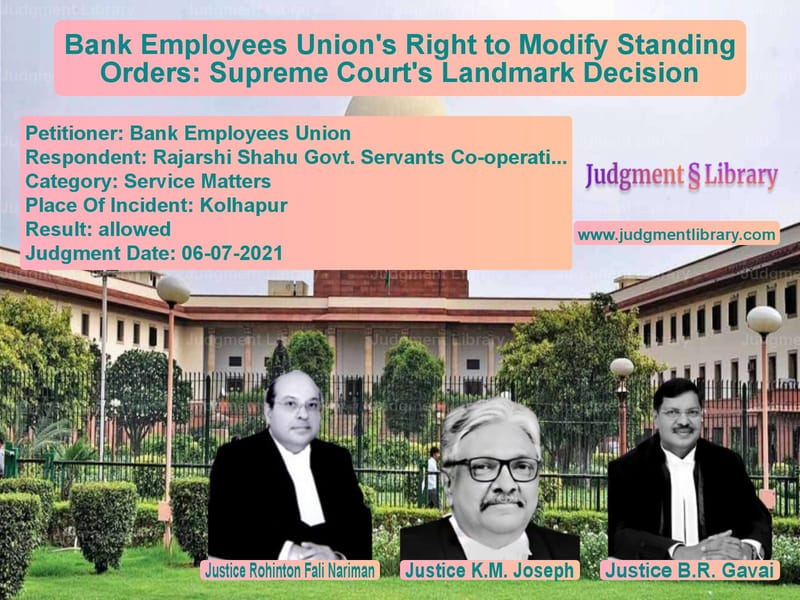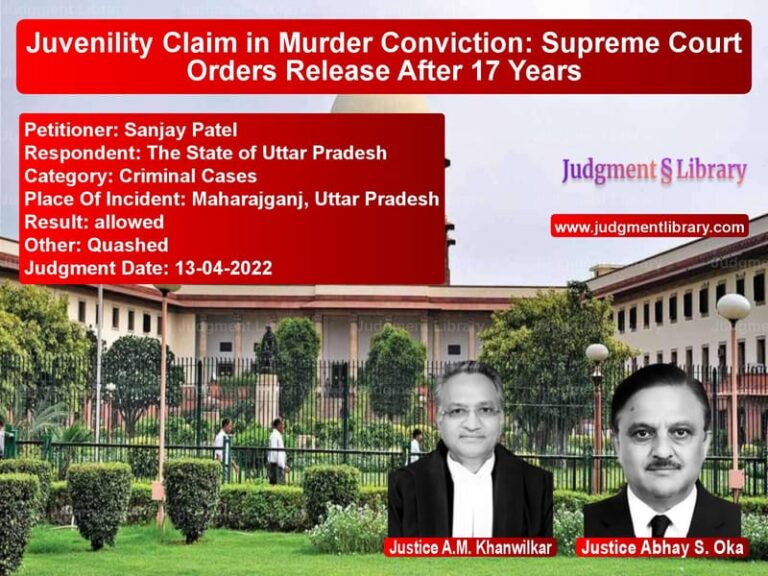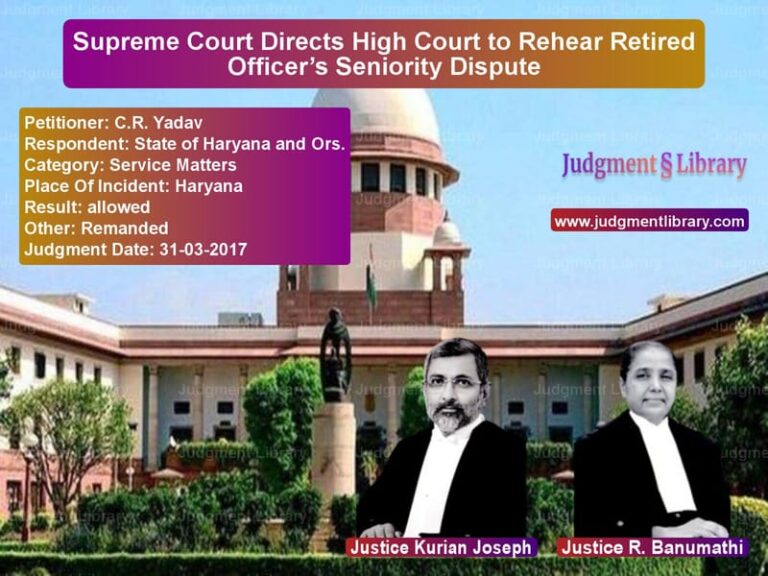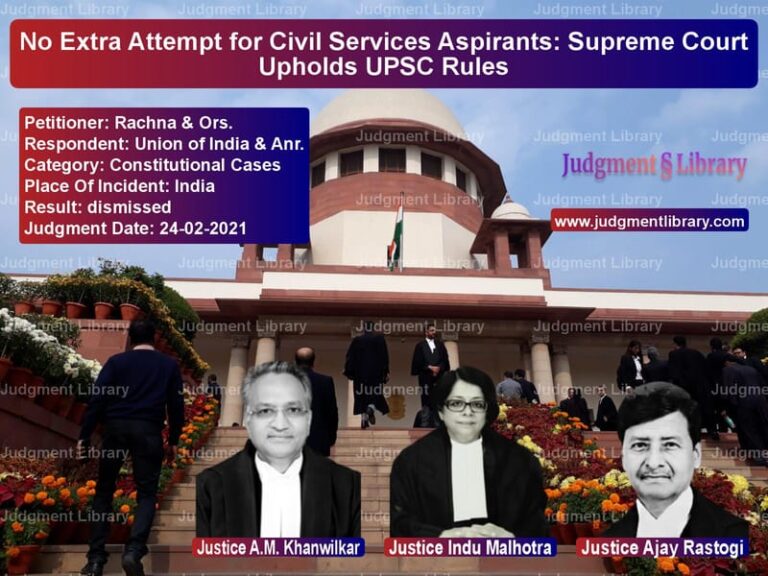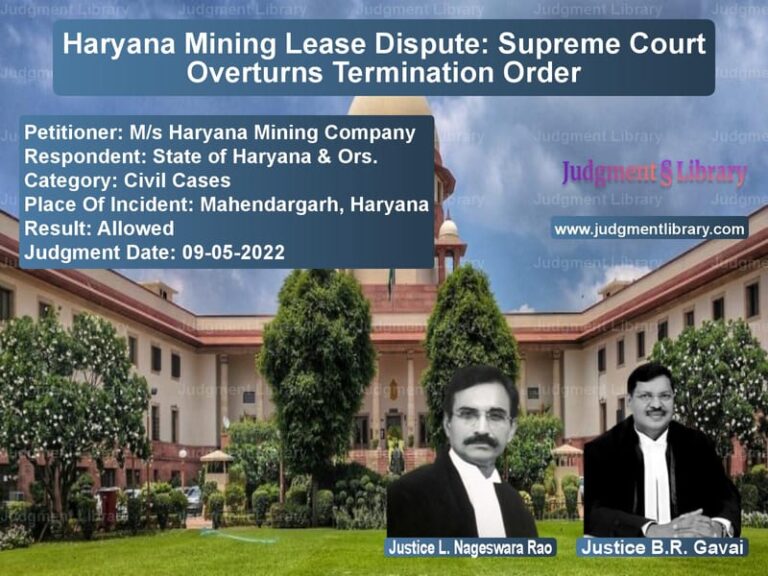Bank Employees Union’s Right to Modify Standing Orders: Supreme Court’s Landmark Decision
The case before the Supreme Court involved the Bank Employees Union and Rajarshi Shahu Govt. Servants Co-operative Bank Ltd., Kolhapur. The core issue in this case was whether the appellant, a registered trade union, had the legal standing (locus standi) to apply for modifying a standing order that governed the employees of the respondent under Section 38(2) of The Maharashtra Industrial Relations Act, 1946.
Background of the Case
The dispute revolved around the retirement age of employees working at the bank. The original standing order specified that employees would retire at the age of 55, with a possibility of extension up to three years at the discretion of the bank’s president.
However, in two separate settlements between the bank and its employees dated January 11, 2004, and February 21, 2010, the retirement age was mutually increased to 58 years. Subsequently, an award was issued by the Industrial Court on March 10, 2010, formalizing this change. To ensure compliance, the registered trade union filed an application on behalf of employees on April 26, 2011, seeking modification of the standing order under Section 38(2).
Industrial Court’s Ruling and High Court’s Judgment
The Additional Labour Commissioner approved the change in the standing order and ruled that employees should retire at 58 years. However, the bank challenged this decision, arguing that only an individual employee, not a registered trade union, could apply for such modifications under Section 38(2). The Industrial Court upheld the bank’s objection and ruled that the trade union lacked the locus standi to file the application.
The Industrial Court, despite its ruling, expressed concern about the bank’s actions, stating:
“No doubt, the Appellant Bank had executed an Agreement with the Opponent Union and in the said Agreement, it was decided to change the age of retirement from 55 years to 58 years. But, the Appellant Bank has made change in its Standing Orders by moving an application under Section 38(2) of The Bombay Industrial Relations Act, 1946. This act of the Appellant Bank shows the attitude of the Bank towards its employees.”
The High Court upheld the Industrial Court’s decision and dismissed the writ petition filed by the union.
Arguments Before the Supreme Court
Senior Advocate Colin Gonsalves, representing the union, contended that the Industrial Court and High Court had overlooked Section 27A of the Maharashtra Industrial Relations Act. He argued that the employer should not be allowed to retract from its commitment made in the settlements. Furthermore, he asserted that the union’s role in representing employees should be recognized, especially since both the employer and employees had already agreed to the change.
On the other hand, Senior Advocate Vinay Navare, representing the bank, supported the High Court’s ruling. He emphasized that the statute differentiated between an ’employee’ and a ‘representative union,’ and since Section 38 specifically mentioned only ’employee,’ the union had no authority to file such an application. However, he conceded that if the court disagreed with his position, the matter could be remanded to the Commissioner of Labour for reconsideration, provided individual employees were included in the application.
Supreme Court’s Verdict
After hearing both sides, the Supreme Court ruled in favor of the union. The Court held that since the settlements and subsequent award had already established 58 years as the retirement age, the bank could not now challenge the union’s role in implementing the agreed-upon terms. The Court stated:
“Ultimately, as correctly argued by Mr. Gonsalves, the Ministerial duty of implementing the settlement was on both the employer and the employees. It so happened that the appellant moved an application before the Commissioner of Labour. The said application could and should have been joined in by the employer, and in this backdrop, it would be clear that any technical objection as to a registered union having no locus to file an application under Section 38(2) of the said Act, cannot be countenanced.”
The Supreme Court overturned the Industrial Court’s ruling, stating that the bank should not be allowed to escape its obligations under the settlements. It ordered that all consequential benefits be provided to employees within six months.
Conclusion
This decision reaffirms the importance of settlements between employers and employees and prevents employers from retracting agreed-upon terms based on technical loopholes. The ruling strengthens the role of trade unions in representing employees and ensures that collective bargaining agreements are upheld.
Petitioner Name: Bank Employees Union.Respondent Name: Rajarshi Shahu Govt. Servants Co-operative Bank Ltd., Kolhapur.Judgment By: Justice Rohinton Fali Nariman, Justice K.M. Joseph, Justice B.R. Gavai.Place Of Incident: Kolhapur.Judgment Date: 06-07-2021.
Don’t miss out on the full details! Download the complete judgment in PDF format below and gain valuable insights instantly!
Download Judgment: bank-employees-union-vs-rajarshi-shahu-govt.-supreme-court-of-india-judgment-dated-06-07-2021.pdf
Directly Download Judgment: Directly download this Judgment
See all petitions in Employment Disputes
See all petitions in Workplace Harassment
See all petitions in Pension and Gratuity
See all petitions in Termination Cases
See all petitions in Judgment by Rohinton Fali Nariman
See all petitions in Judgment by K.M. Joseph
See all petitions in Judgment by B R Gavai
See all petitions in allowed
See all petitions in supreme court of India judgments July 2021
See all petitions in 2021 judgments
See all posts in Service Matters Category
See all allowed petitions in Service Matters Category
See all Dismissed petitions in Service Matters Category
See all partially allowed petitions in Service Matters Category

